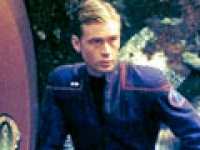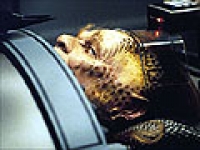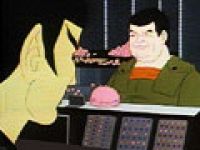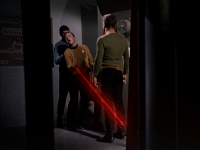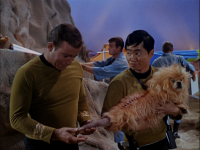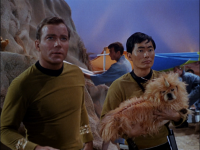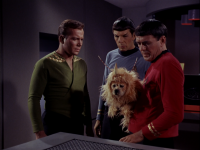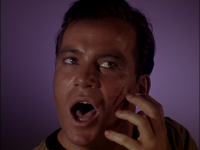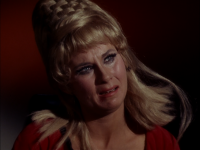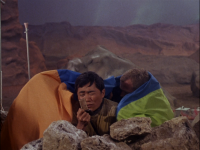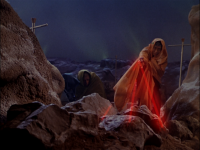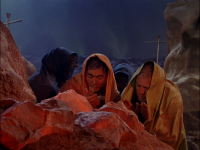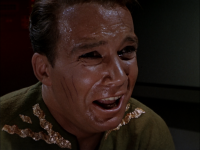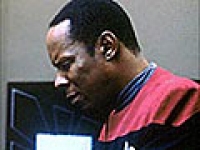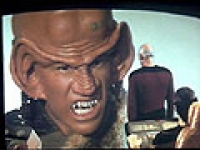Star Trek: Newest — 1x05 — Cupid's Errant Arrow
Synopsis
Mariner is suspicious of Boimler's new girlfriend. Tendi and Rutherford grow jealous of a bigger starship's gear.
Remarkable scenes
- Boimler: "I can't believe she used to date Jet! That guy's like a Kirk sundae with Trip Tucker sprinkles!"
- Mariner's flashback to visiting Deep Space Nine.
- Freeman: "There are two fucking people on your whole fucking planet?! [...] Implode the moon."
Review
Mariner and Boimler were both pretty annoying in this episode, though at least Mariner had an excuse given that when she said before that she'd "seen stuff" she sure wasn't kidding! It was played off as a bit of a joke by the plot, but in all seriousness what she experienced while visiting Deep Space Nine would leave most people with a bit of PTSD. Also wow it was nice to see DS9 again, if only they'd given us a bit meatier a cameo. Oh well.
Beyond that there's not a whole lot to talk about with this one. The girlfriend A plot was a mixture of irritating and entertaining. The Tendi/Rutherford Vancouver recruitment B plot was mostly forgettable. And the diplomacy C plot was a bit more interesting but would've been a lot better if it had been fleshed out more. Fairly mediocre overall, but not bad.
Star Trek: Newest — 1x05 — Stardust City Rag
Synopsis
The La Sirena crew begin an unpredictable and lively expedition on Freecloud to search for Bruce Maddox. When they learn Maddox has found himself in a precarious situation, a familiar face offers her assistance.
Remarkable scenes
- Icheb getting butchered. Whoa.
- The chilling "Where's your cortical node, buddy?" remark refers to the fact that Icheb doesn't actually have one because he donated it to Seven of Nine to save her life in the very touching episode Voy: Imperfection.
- Raffi: "Rios, you seriously really need to sell this. You can't do your brooding existentialist space man routine."
- Raffi's son rejecting her.
- Seven: "After they brought you back from your time in the collective, do you honestly feel that you regained your humanity?" Picard: "Yes." Seven: "All of it?" Picard: "...No. But we're both working on it, aren't we?" Seven: "Every damn day of my life."
- Seven taking her revenge.
- Picard meeting with Maddox, discussing Dahj and Soji.
- Agnes murdering Maddox.
Review
Hey guys, remember Icheb? That adorable ex-Borg who Seven of Nine thought of as a son? After Voyager made it home, it turns out he became a Starfleet officer! Isn't that sweet? He put on a red uniform and... oh shit.
The horrific demise of Icheb is not the kind of closure for a previous character many of us expected from this show, but it is appreciated nonetheless. One of many loose ends left by TNG, DS9, and Voyager tied up now for better or worse. We even got an update on what Quark is up to, apparently running a bar on Freecloud, or at least franchising the brand out. Plus the line about Quark being "especially satisfied" with Rios' fictional alter ego's handling of his "trouble with the Breen" implies that Quark was either personally recruited by Raffi to participate in the scam in this episode, or at least that Raffi felt Quark was a reputable enough businessman in this community—such as it is—to forge his name to an endorsement to make it sound credible.
Of course the most notable closure we got in this episode is for Seven of Nine, who we learn has joined a group called the Fenris Rangers, a group that sounds very similar to the Maquis in the sense that both were outlaws trying to keep order as they defined it in a place where law and order had broken down to a degree. It would've been nice to hear if Seven's experience with so many ex-Maquis on Voyager played a role in her radicalization of sorts. A particularly sad omission was we got no mention of her previous relationship with Chakotay which is an omission almost as conspicuous as the continued extremely unfortunate lack of discussion about sentient holograms—Voyager's doctor in particular—and how that relates to the ban on AI.
Indeed, Seven becoming a vigilante is second only to Icheb's unceremonious demise in terms of the most depressing things about this show so far. Seven and Icheb come to the Federation with Voyager brimming with potential, but it is squandered in a tragic and empty way. Depressing outcomes such as this driven by the Federation being demoralized and divided is exactly what Picard is trying reverse in his somewhat loopy quest to save a far flung android. You can see how committed Picard remains to restoring the upstanding and merciful Federation from 15 years ago when he insists that Seven not take her revenge. Seven's decision to let Picard think he had convinced her was quite touching, but yet another tragedy of the story is Seven was actually right to take her revenge. Not because of the principle of an eye for an eye, but because as Seven had noted, Bjayzl operated in a lawless place. If Seven didn't take her out, she was just going to keep butchering more ex-Borg. Maybe Seven could've taken her prisoner or something, but it seems likely that the Fenris Rangers lacked the resources to run a maximum security prison. Besides, Bjayzl seemed like the sort of person who could organize a sophisticated jailbreak if need be.
Another tragic element of the story was the revelation that Raffi's drug-induced bouts of paranoia described in her first scenes were far from just a bit of dark humor as the early scenes implied, but in fact turned out to be a full-blown drug addiction that drove her son to cutting her off, regarding her as a toxic family member. Raffi trots out a slate of cliched stock phrases commonly offered up by struggling addicts about having gotten clean and about having changed and having become a better person. Anyone who knows a drug addict knows how difficult it is to trust such statements, so Hwang rejecting her is an entirely reasonable if perhaps wrong choice in this instance. It is likely Raffi truly did get clean since hitching a ride on the La Sirena and it is likely her wacky conspiracy theory will turn out to be correct as well. But even so, Hwang has no reason to believe any of that until Raffi produces extraordinary evidence for her extraordinary claims.
Speaking of Hwang, the fact that he was at a fertility clinic was a very interesting detail. It's been strongly implied in many previous Star Trek series that interspecies breeding—while possible—is often quite difficult to achieve at times, so adding more texture to that long established fact is appreciated. One detail that we seriously could've done without though was the cheesy holographic advertising scene when they arrived at Freecloud. If it had happened when they were on the surface in the streets or something maybe that would've been less objectionable, but the idea of fully interactive holograms appearing inside of people's ships in orbit raises lots of difficult to resolve questions, most alarmingly related to security. So once you enter orbit of Freecloud, people can just project holograms into your ship which can gather information via interaction or perhaps listen to conversations? Sounds like a good way to spy on people or steal their data!
Of course another shocking development was finally catching up with Bruce Maddox only to see him murdered by Agnes shortly thereafter. She wishes she didn't know what she knows. She wishes "they" hadn't shown her what "they" showed her. Whatever it was she learned caused her to become ideologically opposed to Bruce Maddox's quest to carry on Dr. Soong's legacy of building ever more sophisticated and human-like androids despite having previously been a full partner with him in that endeavor in more ways than one. Hopefully we find out what terrible secrets she learned soon and hopefully it makes her shocking murder of her lover at least somewhat sympathetic somehow.
Star Trek: Newest — 1x05 — Choose Your Pain
Synopsis
While on a mission, Lorca unexpectedly finds himself in the company of prisoner of war, Starfleet Lieutenant Ash Tyler and notorious intergalactic criminal, Harry Mudd. Burnham voices her concerns about the repercussions of the spore drive jumps on "Ripper."
Remarkable scenes
- Mudd: "I used to have a life, captain. A good one. A respectable business. That all got blown up because of your goddamn war." Lorca: "Starfleet didn't start this war." Mudd: "Of course you did. The moment you decided to boldly go where no one had gone before. What did you think would happen when you bumped into someone who didn't want you in their front yard?"
- Tilly: "You guys this is so fucking cool!"
- The tardigrade going into some kind of protective hibernation to save itself.
- Saru ordering Culber to force the injured tardigrade into powering the spore drive one more time. Culber's response: "I will not be party to murder."
- Stamets subjecting himself to the spore drive to save the tardigrade's life.
Review
This episode does much to recover from the missteps of the previous two. Opening with Burnham struggling with the morality of exploiting the tardigrade to gain a tactical advantage over the Klingons taps into the stuff that made Voy: Equinox so good. It took longer to get here than it should have, but it's still good stuff nonetheless. Ultimately, this is a fairly uplifting episode compared to the others so far. Burnham gets to free the creature, Lorca gets to atone for past sins to some degree, and Stamets gets to be a genuine hero. And when the science nerds are geeking out over their research, the story nearly breaks the fourth wall when Tilly exclaims her excitement with Star Trek's very first "fuck," as though the characters themselves are glad the writers finally let them do some real science and tapped into the spirit of Star Trek in a real way for the first time since the opening moments of the pilot.
There are only shades of it though. Turns out Starfleet is hunting for more tardigrades and doesn't seem all that interested in wrestling with the ethics. Even Saru refuses to hear out Burnham about the harm they were doing to the creature; a surprising development for a character who thus far has seemed beyond reproach at all times. He later comes around and pleads with Burnham to "go save its life," which was a nice piece of character development, but the payoff was a bit lackluster as the immediate consequence was for Burnham to recklessly dump it into space without the slightest clue as to whether she would be saving the creature or inadvertently executing it.
While it's certainly true that real life tardigrades are pretty hardy and it's reasonable to assume a macroscopic one that lives in space can probably survive a vacuum, just because an animal has tolerance for extreme conditions doesn't mean that such extreme conditions are in fact its ideal habitat. They never figured out how the tardigrade got aboard the Glenn to begin with and never got any hard information about what exactly the tardigrade's natural habitat actually was. So when Burnham saved its life, the whole thing amounted to a lucky guess based on a hunch. Happy endings are nice, but happy endings that just as easily could've been hubris aren't quite what the spirit of Star Trek is all about. Except of course when Janeway flies head first into a binary pulsar. But at the time in Voy: Scientific Method she was pumped up on drugs by bad guys to keep her dopamine levels high specifically to make her act erratically. Plus she hadn't slept in four days and had been in constant pain the whole time. Janeway's recklessness was an act of desperation. Burnham's was just reckless.
There were other, smaller deficiencies in the story as well. Saru's anger and/or jealousy directed towards Burnham regarding her closeness to Georgiou wasn't at all compelling. And we're treated to Stamets getting into yet another petty argument with someone. This time it was Burnham over whose idea it was to use a living creature as a navigational tool. It was also distinctly odd that we never got any real details about what exactly Tyler went through with that Klingon female captain. Luckily these weak storytelling beats were far less numerous and distracting this time than in the past two episodes.
Perhaps the most notable piece of storytelling in this episode is the breadth of character development we get for Lorca. It turns out Lorca was such a valued officer that after losing his previous ship with all hands that he was swiftly given another command and given free rein to fight the war however he saw fit, to such an extent that he frequently goes on unsanctioned missions that are only just now being reined in. The reason for his light sensitivity is revealed here too. Interestingly Lorca lied to the admiral about why he doesn't get his eyes fixed, citing a supposed distrust of doctors. He later reveals to Tyler during their escape on the Klingon space peacockraider that he doesn't want to fix his eyes because the pain helps him remember what he did to his previous crew.
The backstory of the Buran sets up Lorca as a tragic character in ways very reminiscent to Burnham. Both of them inadvertently caused the deaths of people they care about, but in many ways Lorca appears to be struggling with his version of this far more, despite being arguably less culpable. Besides his generally unhealthy obsession with the study of war and his masochistic desire to not fix his eyes, it was also particularly disturbing to see him throw Stuart, Harry Mudd's innocent pet against the wall, nearly killing it, for no other reason than to upset Mudd. This kind of completely unnecessary casual cruelty and indifference towards life are indicators of Lorca's poor mental health. As was Lorca's prior eagerness to capture and experiment upon the tardigrade. Likewise, while perhaps an intentional homage to Kirk's actions in TOS: I, Mudd, it was pretty horrifying to see Lorca leave Mudd in the hands of the Klingons; striking him even on his way out. Earlier Mudd tried to remind him that there are billions of civilians at risk on the ground while Starfleet makes war in the skies above them. Ultimately, Lorca's first duty is to protect civilians like Mudd, but he seemed all too willing to forget that simply because Mudd was selfish and obnoxious, as though that should deprive him of his human rights as a Federation citizen.
The surprising star of the show this episode though was Stamets. After a weak start at the beginning, Stamets enlists fully in Burnham's quest to unlock the full potential of the spore drive without causing further harm to the tardigrade. Then he bravely risks his own life to save both the tardigrade and his ship when he pilots the ship out of danger by taking the tardigrade's place as the spore drive's navigator. Shortly thereafter, Stamets also gets the distinction of depicting the first gay romantic relationship in a Star Trek TV series in the episode's closing scenes. Seeing Stamets and Culber in private together was a nice piece of character development that would've been nice to have gotten earlier. It makes them both suddenly feel far more relatable. We could've done without that sinister hangover effect from piloting the spore drive cliffhanger though. It felt forced and wasn't really needed. It would've been far more touching to end on Culber begging Stamets not to put himself in danger like that again, leaving the threat of lasting side effects from piloting the spore drive to be more of an implied threat rather than hamming it up like they did with that cliffhanger.
Star Trek: Newest — 1x05 — Unexpected
Synopsis
After discovering the presence of a damaged alien vessel, Archer dispatches Tucker to its aid, but the engineer's encounter with a Xyrillian female has an unexpected side effect.
Remarkable scenes
- The loss of gravity while Archer was taking a shower. :)
- Trip trying to adapt to the truly alien environment aboard the Xyrillian ship.
- T'Pol: "Three days. You were only there for three days and you couldn't restrain yourself."
- Trip defending himself against allegations of ungentlemanly behavior.
- Archer's less than perfect attempt at diplomacy with the Klingons regarding the Xyrillian ship.
- T'Pol using her knowledge of Klingon culture to diffuse the situation somewhat.
- The Klingons ridiculing Trip.
- Klingon, impressed by the holodeck: "I can see my house from here!"
Review
Like Ent: Fight or Flight, this is another well thought out episode that uses the prequel premise well. We are shown a few annoying things though. For one, the Xyrillians are a new, made up race. Again, I'm wondering why it was necessary to introduce a new race rather than use one shown before. I am willing to cut a lot of slack in this case though seeing as how I'm at a loss to come up with a race anything like the Xyrillians previously featured that would have been appropriate for use here. I was also pleased at how alien the Xyrillians were. It was a most credible rare treat to show Trip having such a hard time adapting to the Xyrillian atmosphere. Unfortunately though, the episode is clouded a bit because we're shown a fully functional holodeck, sans interactive characters. We've seen technology this advanced as early as TAS, but that's still a very long way off. Granted, Enterprise did not acquire this technology. But the Klingons did. This episode, as well as the use of a holodeck on TAS both seem to contradict TNG, in which all the characters were amazed at the holodeck. This is only a minor inconsistency though. It's possible creating landscapes was nothing new by the 24th century, but creating people and interactive settings was. Then again, in Voy: Once Upon a Time, Janeway mentioned having played the Flotter program when she was a child. Given that she's middle aged, this connotes interactive holodeck technology being in widespread use at least twenty or thirty years before the first episode of TNG. It would seem TNG has been contradicted on three fronts now. We'll just have to accept that on TNG, holographic technology was "new to them," or that it made significant advances, warranting a renewed "wow" reaction. That said, this episode's story was quite amusing without becoming too silly. I love how Trip was forced to admit to Klingons that he was pregnant. It much reminded me of Spock's line in Star Trek V: The Final Frontier: "Please, Captain. Not in front of the Klingons." (Which was a relatively nice scene in an otherwise abysmal movie.) The crew handles the situation as professionally as they can; I rather liked how arrogant and presumptuous T'Pol was in the beginning regarding Trip's alleged behavior. I also liked how she made up for it by using her superior knowledge of Klingon culture to assist in the diplomatic negotiations. She damn near cracked a joke at the end too with her little history book statistic. Suffice it to say, I liked T'Pol more in this episode than in previous ones. She's starting to show that, yeah, she's a stuffy annoying killjoy, but she can be cool at times.
Star Trek: Newest — 1x05 — Phage
Synopsis
An alien race harvests Neelix's lungs.
Remarkable scenes
- Neelix having taken over Janeway's private dining room and turning it into a galley.
- Neelix attacked by the Vidiian.
- The Doctor coming up with the idea of holographic lungs for Neelix.
- The Doctor demonstrating how real holograms can be by slapping Paris. :)
- The Doctor: "I'm a doctor, Mr. Neelix, not a decorator." Count 10 for "I'm a doctor, not a (blah)" style lines, which McCoy was famous for.
- Tuvok: "Captain, may I suggest you consider carefully what you are about to do?" Janeway: "How do you know what I'm about to do?" Tuvok: "I could describe to you in detail the psychological observations I've made about you over the past four years which lead me to conclude you're about to take this ship inside the asteroid. But suffice it to say, I know you quite well." Janeway: "One of these days I'm gonna surprise you Tuvok. But not today."
- Tuvok's phaser locator beam trick.
- The Vidiians insulting the Doctor's "primitive" medical knowledge.
Review
The first Vidiian episode is certainly interesting. It's easy to develop a certain sympathy for them; it's not their fault what's happening to them, and what else are they supposed to do to survive? This makes the episode far more serious than the similar one TOS: Spock's Brain, and much more enjoyable. Janeway's evaluation of her moral options regarding the Vidiians was quite correct and very well executed. And I like how the Vidiians were willing to help, to try and demonstrate in some small way their good faith. A pleasing episode.
Star Trek: Newest — 1x05 — More Tribbles, More Troubles
Synopsis
The tribbles return for more trouble as the Enterprise encounters Cyrano Jones, the Klingons and a new breed of the popular pest.
Remarkable scenes
- The Klingons attacking the scout ship.
- The Klingons disabling the Enterprise with their new weapon.
- Uhura, regarding the ship being defenseless: "We could always throw rocks!"
- Spock: "You can't afford to lose that grain!" Kirk: "I can afford to lose the Enterprise even less!"
- Kirk winning against the Klingons using the robot ships.
- A tribble eating creature! Hahaha.
- The tribble eating creature trying to sink his teeth into a giant tribble.
- Kirk reluctantly defending Cyrano Jones from the Klingons.
- The Klingons buried in tribbles.
- Kirk buried in tribbles.
Review
This episode is a funny homage to TOS: The Trouble with Tribbles. Indeed, it's funnier than the original, even if less intelligent a plot. You have to forgive it for that, as TAS was largely marketed to children. Granted it was cliched to deliberately bury people in tribbles again, I would have seen it as a missed opportunity if they hadn't taken advantage. :)
Star Trek: Newest — 1x05 — The Enemy Within
Synopsis
A transporter malfunction creates an evil Kirk.
Filler rating: bad filler
Pretty lame episode with no significant long term continuity.
Remarkable scenes
- Evil Kirk being evil.
- Rand telling her story in the presence of good Kirk.
- Kirk confronting his other half.
- Spock Vulcan neck pinching evil Kirk.
- McCoy regarding the alien dog: "He's dead, Jim." Count 2.
- Spock and McCoy arguing over whether the dog died of terror or some technical malfunction with the transporter reintegrating its two halves.
- Evil Kirk pretending to be good Kirk.
- Kirk's reintegration.
Review
The Enemy Within is story with a high minded idea but poorly executed characterization. The episode seems so infatuated with the idea of Kirk having two mutually exclusive halves to his personality which he's in a constant struggle to reconcile that they exaggerate the whole ordeal to the point of ridiculousness, overlooking any opportunity to more deeply explore his character in the process. That said, there are a few worthwhile details here and there.
I like how one of the first things evil Kirk does is pursue Rand. It's good continuity with The Naked Time where Kirk expressed hidden desires for Rand. Another nice detail was Spock comparing his struggle to reconcile his human and Vulcan ancestry with Kirk's split in two dilemma. Finally, I certainly do enjoy the idea of exploring human psychology in the sense that we all have more basic instincts that we not only need to suppress but also at times need to draw on in order to reach our full potential.
The trouble is what little exploration of this topic the episode engages in is shallow at best. As such, there's little of value in this story other than the amusement of watching evil Kirk do evil things along with one or two decent action scenes. Overall this is a pretty disappointing offering.
Star Trek: Newest — 1x05 — Babel
Synopsis
A mysterious epidemic sweeps over Deep Space Nine, and Kira must find an antidote.
Filler rating: good filler
There's no essential plot or exposition in this episode that renders it unskippable, but it's a decent episode, even though it could have been better.
Remarkable scenes
- The chief's bad day; feeling overwhelmed by people's demands.
- Sisko: "Chief! I thought you were going to fix the replicator!" O'Brien: "You're absolutely right sir, I knew I'd forgotten something. Can't have the operations chief sitting around daydreaming when there's work to be done, can we? Hohohoho... I'll get right on it!"
- Odo picking on Quark.
- O'Brien starting to talk funny.
- Dax: "I'd forgotten what it was like." Kira: "What what was like." Dax: "Being female. I haven't been one in over 80 years."
- O'Brien speaking jibberish.
- Dax talking jibberish.
- Random crewmembers speaking jibberish.
- Odo discovering Quark was making unauthorized use of crew quarters replicators. Quark: "How did did you figure it out?" Odo: "You claimed Rom fixed your replicator. Rom's an idiot. He couldn't fix a straw if it were bent." Completely untrue, as we later learn Rom is somewhat autistic. But Odo's hunch had merit.
- Jake talking jibberish.
- Bashir succumbing to the disease.
- Kira kidnapping the good doctor and infecting him.
- Sisko talking jibberish.
- Quark coming to Odo's aid and teasing him.
- Sisko's coffee in the end burning him again.
- Morn appearances; 1. In Quark's Bar when Quark talks to Dax and Kira; 2. in Quark's Bar when Odo goes in to ask Quark about the the quarantine.
Review
While a fatal-virus-infects-the-crew episode seems a bit abrupt this early in the show, it nevertheless makes for some entertaining viewing. Everybody speaking jibberiish is great. See if you can repeat a few of those lines to some of your friends mid conversation, it will get you some funny looks. Horseback green undertow in the backwater. Sun rising crest between two ducks. Appalling nature exacts vast insurgency. Oh what fun. Who doesn't like a good word salad?
Star Trek: Newest — 1x05 — The Last Outpost
Synopsis
The crew encounters Ferengi bandits.
Filler rating: bad filler
While this is the first appearance of the Ferengi, it is not necessary to see this episode to understand later episodes, even Ferengi-centric episodes.
Remarkable scenes
- The Chinese finger trap scene.
- The Ferengi expressing disgust at "clothed females."
Review
Another stylistically awkward episode, but not as bad this time. The Ferengi are thought to be a serious threat at first, but it turns out that they were merely posturing to appear more threatening than they actually were. In reality they are mostly harmless and totally ridiculous. Meanwhile, yet another godlike alien shows up and also appears to be a serious threat at first, but is soon mollified by Riker answering a few riddles. Riker then gets all chummy with this "guardian of the Tkon Empire" who for some reason isn't all that broken up about having slept through the demise of his entire nation.
Contented with having an insufferably smug conversation with Riker about the inferiority of the Ferengi right in front of them, the guardian then disarms the automated weapon that disabled both the Enterprise and the Ferengi ship, then makes known his intent to return to his everlasting coma, possibly never to be seen again by anybody ever. Okay. Right. Sure.
Clearly these parallel scary aliens who turn out not to be so scary after all were meant to mirror TOS: The Corbomite Maneuver, one of TOS' less savory episodes. This episode manages to only slightly improve on the original's formula by having slightly less terrible pacing. It appears they also wanted to evoke TOS by beaming over the Chinese finger traps to the Ferengi ship. This is similar to how Scotty beamed over the tribbles to the Klingon ship in TOS: The Trouble with Tribbles.
Setting aside Star Trek's oft-overwrought stylistic choices though, there are some nice details here. It's nice to see the Ferengi make an appearance, who were first mentioned in Encounter at Farpoint. The designs of their ship, alien makeup, and their weapons were memorable too. And while their function as a caricature of capitalism was as overwrought as most of the rest of the episode, the idea of portraying a less socialist and more capitalist version of the Federation on Star Trek is intriguing. As such it would be well worth exploring the Ferengi in more depth later, though next time hopefully less childishly.



